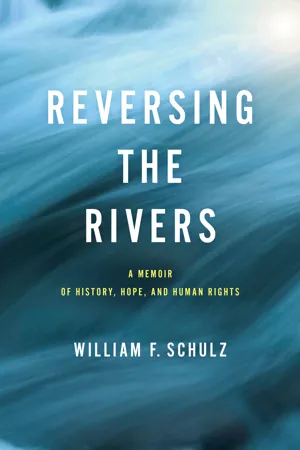
- 344 pages
- English
- ePUB (mobile friendly)
- Available on iOS & Android
About This Book
From 1994 to 2006, William F. Schulz headed Amnesty International USA. During this time, he and the organization confronted some of the greatest challenges to human rights, including genocides in Rwanda, Bosnia, and Sudan; controversies over the prison camp at Guantanamo Bay, Cuba, and the use of torture by the United States after 9/11; as well as growing concern about inequities in the American justice system, from police misconduct to the death penalty. Drawing upon his encounters with tyrants, the inspiration of brave human rights heroes, and collaborations with celebrities ranging from Patrick Stewart to Salma Hayek, Schulz uses poignant narrative and amusing anecdotes to discuss the day-to-day realities of struggling with life-and-death human rights crises. In the process he ducks an assassination threat in Liberia; brings tears to the eyes of the Prime Minister of Northern Ireland; and bests America's self-described "toughest sheriff" on Bill Maher's Politically Incorrect. Full of reflection as well as action, Reversing the Rivers provides Schulz with the opportunity to address profound philosophical questions, such as "What is the nature of evil?"; "How do we foster the 'better angels of our nature'?" "When may we use force to stop people from using force?" "Is the prohibition on torture as simple as it seems?" and "What's wrong with an eye for an eye?" Most important, in an eloquent concluding chapter, he answers the quandary most frequently posed to him during his years at Amnesty, "Given all the horrors in the world you see day after day, how do you retain any hope at all in humanity?"
Frequently asked questions
Information
Table of contents
- Cover
- Also by William F. Schulz
- Title Page
- Series Page
- Copyright
- Dedication
- Epigraph
- Contents
- Introduction
- Chapter 1. Welcome to Genocide
- Chapter 2. Prisoners of Conscience: The Dynamics of Rescue
- Chapter 3. Holding the Whole World in Our Hands
- Chapter 4. Into the Maelstrom: Liberia, Northern Ireland, and Darfur, Sudan
- Chapter 5. My Country ’Tis of Thee: US Domestic Human Rights Violations
- Chapter 6. 9/11 and the Mainstreaming of Torture
- Chapter 7. Star Power
- Chapter 8. The Inside Scoop
- Chapter 9. Despite Cruelty
- Photographs
- Common Questions About Human Rights
- Notes
- Index
- Acknowledgments